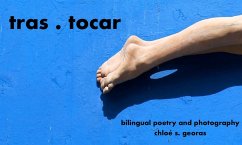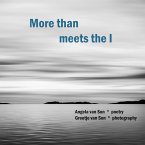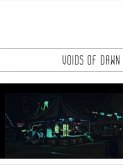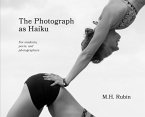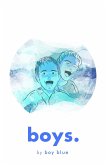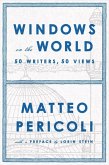Tras . Tocar, un libro de poesía bilingüe e imágenes de Chloé S. Georas, nos advierte que no hay tacto sin trastocamientos ni roce sin riesgos. La autora define tras . tocar como "alterar el orden que mantienen ciertas cosas o el desarrollo acostumbrado de algo como consecuencia del tacto". Sus versos e imágenes son umbrales a paisajes cotidianos de intimidades apocalípticas, convocándonos a armarnos de vulnerabilidad para enfrentar con irreverencia el sentido común que hornea las violencias del pan nuestro de todos los días.
"Now Chloé Georas's objectexts take on a third dimension: they shift, become three dimensional and must be disrupted upon opening them. This last impulse, triggered by the invitation to read and touch, implies the possibility of disengaging the objectexts from authorship itself. In this way, touch acquires meaning and links two sides that were initially separate, mediated by the generosity of the tactile offering (delivery, exhibition, publication) with the inventiveness and imagination that affection stimulates in the neurons of what lies in our hands. Violence is interweaved with resistance: the profound violence against women, the institutional aggression of academia, the everyday mens rea, but also the insistence on a form of writing that transforms the injury into fortitude and strength. Disrupt, transform, transition. The journey is energized by the photos, imbued with a bluish touch, a silent and post-human testament that continues to pull apart and knit the thread of words, affections, translations that disturb our feelings and senses. Here to disrupt ("trastocar") is the metaphor of passing, of displacement that unravels the senses, which are so fragile."
Áurea María Sotomayor
Writer and Professor
University of Pittsburgh
"Just as the period that splits the title tras . tocar, Chloé S. Georas roams through the wonder of the little or the scar, its excessive opposite, to assemble poems that derail our way of perceiving, which is to read with the body. Nothing prepares us for the everyday apocalypse of genocides, migrations, nature, sentimental bonds, quarantines. The disruption provoked by the poems of this bilingual book starts with the period that separates words, the photographs that confront expression, translations that sabotage the arrogance of an absolute meaning, images-explosives or the use of the vertical question. Because the word is wound, question, vagrancy, the poet demands that brave readers walk through the mined bodies of her poems and photographs. This bookwork wants to alter without reassembling. tras . tocar is also to dis . array, to name otherwise through the act of reading. Thea already warned us: the tongue is the only muscle that breaks bones."
Vanessa Vilches Norat
Writer and Professor
University of Puerto Rico
Dieser Download kann aus rechtlichen Gründen nur mit Rechnungsadresse in A, B, CY, CZ, D, DK, EW, E, FIN, F, GR, H, IRL, I, LT, L, LR, M, NL, PL, P, R, S, SLO, SK ausgeliefert werden.

